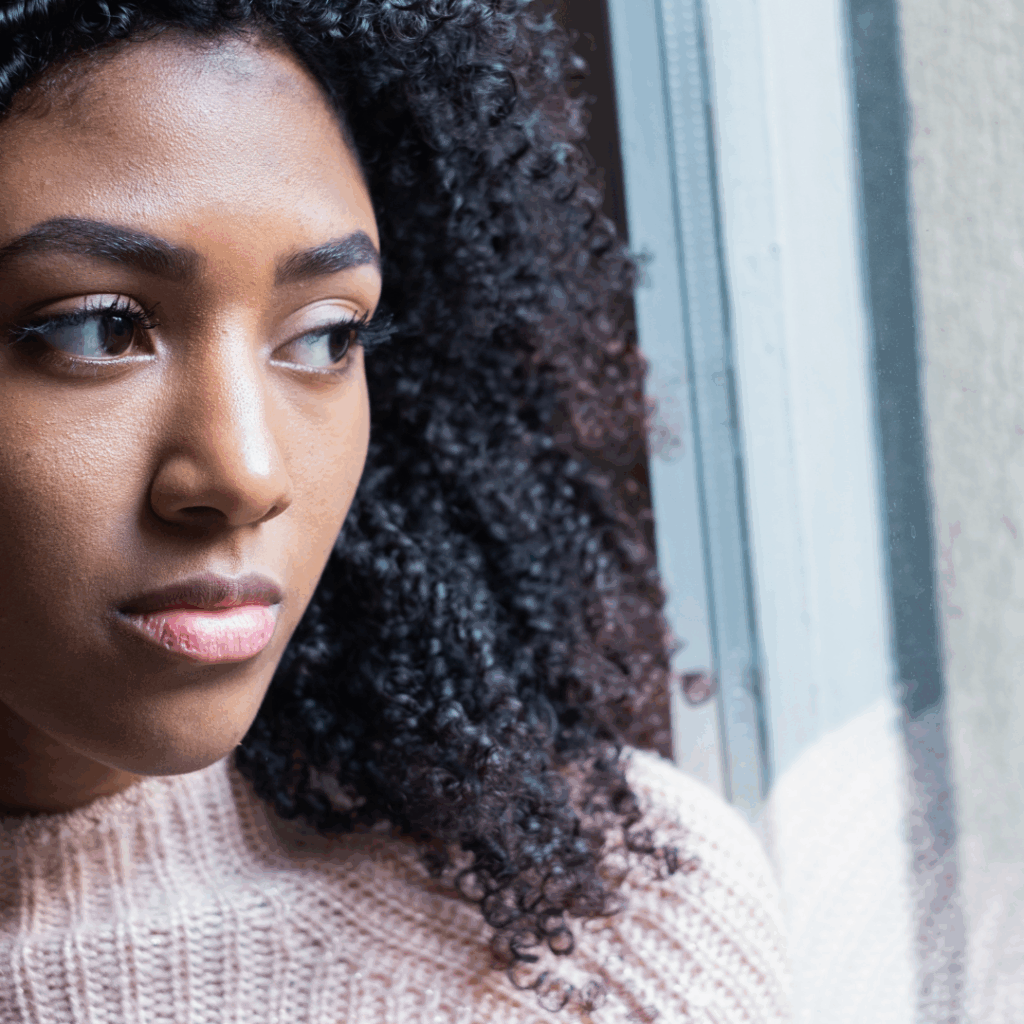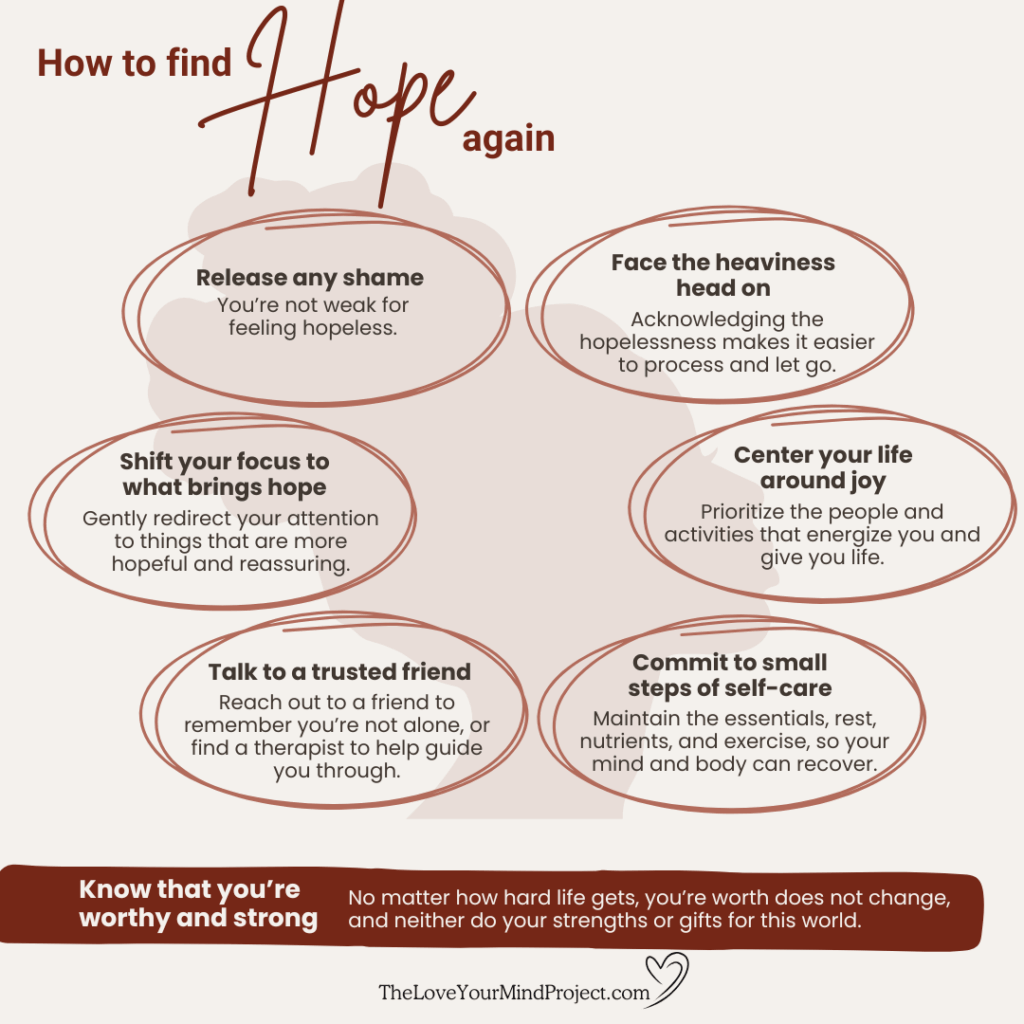- Mental health goals for 2026: What Black women need most (according to therapists who get us) - December 26, 2025
- Depression after drinking: Understanding the emotional crash and what to do about it - December 18, 2025
- How to help a friend with depression: Ways Black women can be supportive without carrying the whole load - December 12, 2025
You’re not weak for feeling hopeless. But you can reclaim hope by releasing what’s heavy and leaning into what brings you joy.

Can we be real? Life can be heavy at times—discouraging, disheartening, “will things ever turn around?” kind of heavy.
Somewhere along the way, admitting this became a sign of weakness and a violation of our faith.
But that’s simply not true.
This guide explores what it means to feel hopeless and the strategies to help you find your way back to peace, strength, and hope.
>> TAKE THE QUIZ: Uncover what you need most right now
What's in this article?
What hopelessness really is (and what it’s not)
Hopelessness isn’t a weakness, character flaw, or shortcoming. It’s a natural response to prolonged stress, loss, or disappointment.
And because we’re human, Black women can experience this heavy emotion too.
“Hopelessness is often what happens when our nervous system is overwhelmed and depleted,” said Dr. Mishelle Rodriguez, psychologist and founder of Collaborative ChangeMakers Counseling and Consulting. “The body’s response to stress is meant to be temporary, so when we’re constantly exposed to stressors, such as social injustice or trauma, our system runs out of energy and drops into a dorsal vagal shutdown—which can make us feel numb, disconnected, unmotivated, or like nothing will ever change.”
But as dark as it may seem, hope isn’t lost for good, especially when you have tools to reconnect with your peace, joy, and strength—no matter what’s going on around you. And you deserve that kind of life.
>> MORE: How to choose self-love over mental health stigma
Reasons you might feel hopeless
It’s not always caused by one thing. For many Black women, hopelessness can be the weight of many compounding layers.
- Social and political extremism: Constant exposure to tragic headlines and hate-fueled politics can make it hard to believe things will change for the better.1
- Job and financial uncertainty: Massive layoffs and rising costs can feed hopelessness2,3, especially for Black women, who are also dealing with intense work stress and discrimination.4,5
- Personal trauma: Whether it’s grief, divorce, or other major life changes, we’re conditioned to “be strong” and “keep the faith” even when we can’t see a way forward.6
Many of us may face these very real issues on top of past wounds that never fully healed. No one should be expected to endure all of this and remain unharmed.
>> MORE: Black women and depression: Signs the burden is too heavy
How to find hope again when it feels lost

Finding hope isn’t about pretending everything is fine or pushing the pain aside. It’s about giving yourself permission to feel, heal, and reconnect with what brings you joy.
Release the shame of feeling hopeless
You’re not weak or broken for losing hope.
“As a survival strategy, Black women are often taught to put aside their feelings in order to be strong for others, said Dr. Rodriguez. “This leaves many of us with the misperception that we’re the only ones who feel the way we do.”
And no, you don’t lack faith.
“Some of us also inherited the belief that negative thoughts or feelings are inconsistent with our faith or values when in fact, doubt and discouragement can co-exist with our strengths and other virtues,” noted Dr. Rodriguez.
Those heavy emotions are your mind’s way of signaling unmet needs. So when you hear, “you’re being too sensitive,” or “let go and let God,” know that your feelings are valid.
Releasing that guilt and shame can create space for deep healing.
Face the heaviness (and your emotions) head on
Ignoring hopelessness doesn’t make it go away. It can push you deeper into it, potentially leading to unhealthy coping habits, like overeating, drinking, or social withdrawal.7,8
Try to acknowledge what’s really there—grief, fear, disappointment, or exhaustion. You can do this through journaling, prayer, or therapy. When you name what’s heavy, you loosen its grip and make it easier to release.
>> MORE: How to start a journal (and why it’s powerful for Black women’s mental health)
Shift your focus to what brings hope
When life feels dark, focusing on everything that’s bad only fuels hopelessness. Instead of dwelling on that negativity, redirect your attention to something hopeful or reassuring—like a memory that brings a smile, a positive affirmation, or a scripture.
Your thoughts shape how you feel, both physically and emotionally. So notice when your thoughts turn grim and gently shift your focus to something more uplifting through healthy habits like meditation, journaling, or breathwork.
Center your life around joy
You can spend hours doomscrolling and absorbing negative news, or you can choose to prioritize the activities and interactions that give you life.
Make a list of things that leave you feeling energized and at peace—like listening to your favorite podcast, spending a few minutes outdoors, or simply texting with your best friend. When you center your life around joy, it leaves less room for despair.
Know that you’re worthy and strong
When you’ve faced repeated pain or disappointment, it’s easy to internalize it—to believe good things just aren’t meant for you. But that’s a lie.
No matter how hard life gets, your worth doesn’t diminish—neither do your strengths or your gifts for this world. When it feels unbearable, remember who you are. You are enough. You are strong, worthy of good, and deserving of peace, love, and joy.
You’ve made it through every hard time thus far—trust yourself to keep killin’ it.
>> MORE: Affirmations for Black women who need help knowing they are enough
Commit to small steps of self-care
It’s easy to forget the basics when you’re weighed down. But the essentials—sleep, exercise, and nutrients—make it easier for the mind and body to recover from emotional wounds.9 Lack of sleep can especially wreak havoc on our mental health, making small frustrations feel like an avalanche.10
Remember, the heavier you feel, the more you need to prioritize and take care of yourself.
Talk to a trusted friend or therapist
Connection is like a strong antidote to hopelessness. So reach out to a trusted friend who will listen and remind you you’re not alone.
A licensed therapist, in particular, can guide you through the most difficult emotions. You can find a culturally-affirming therapist who understands the weight you carry and offers strategies to help you heal.
“With care, rest, community, and practices that refuel us, our nervous system can reset—and when it does, our sense of hope and possibility often returns too,” said Dr. Rodriguez. “It can take time and patience to recover from this type of depletion—it’s not a sign of weakness—it’s often a sign of caring a lot, doing a lot, and being strong for too long.
When to reach out for immediate help
You never have to feel ashamed for feeling hopeless, but you also don’t have to stay in that space.
If that sense of hopelessness turns into thoughts of self-harm or suicide, please reach out to the Suicide and Crisis Lifeline for immediate help. You can call or text 988 to talk with a trained counselor ready to listen and support you. Conversations are confidential and completely free.
Feeling hopeless FAQs
Is it normal for Black women to feel hopeless?
Yes. The “strong Black woman” myth makes it seem like we’re supposed to carry everything without breaking—but we’re human. Constant stress, loss, and trauma—can wear anyone down. But while it’s normal to feel hopeless, it doesn’t mean you have to live there. There are strategies and support that can help you find hope again.
What’s at the root of hopelessness?
Hopelessness can come from chronic stress, loss, unresolved trauma, emotional burnout, and other factors. At its core is the belief that no matter what you do, the outcome will be disappointing. Addressing the root, especially with support, can help you heal.
How can you stop feeling hopeless?
Start by validating your feelings. You’re brave for naming them and shouldn’t be ashamed of how you feel. Then, find spaces like journaling and therapy to process and release those heavy emotions, without guilt or judgment. Lastly, make more room in your life for the people and activities that bring you joy.
References
- Behavioral, W. (2025, January 22). Desert Willow Behavioral Health, LLC. Desert Willow Behavioral Health, LLC. https://www.desertwillowbh.com/blog/the-political-climate-and-its-effects-on-mental-health ↩︎
- Westover, J. H. (2024, April 19). The Devastating Toll of Layoffs: Measuring Human and Organizational Costs. HCI Consulting. https://www.innovativehumancapital.com/article/the-devastating-toll-of-layoffs-measuring-human-and-organizational-costs ↩︎
- Witters, D. (2025, September 9). U.S. Depression Rate Remains Historically High. Gallup.com; Gallup. https://news.gallup.com/poll/694199/u.s.-depression-rate-remains-historically-high.aspx ↩︎
- Women in the workplace 2024 THE 10TH ANNIVERSARY REPORT. (n.d.). https://cdn-static.leanin.org/women-in-the-workplace/2024-pdf ↩︎
- Equal Pay Day: Gender pay gap hits historic low in 2024—but remains too large. (2024). Economic Policy Institute. https://www.epi.org/blog/gender-pay-gap-2024/ ↩︎
- Woods-Giscombe, C., Robinson, M. N., Carthon, D., Devane-Johnson, S., & Corbie-Smith, G. (2016). Superwoman Schema, Stigma, Spirituality, and Culturally Sensitive Providers: Factors Influencing African American Women’s Use of Mental Health Services. Journal of Best Practices in Health Professions Diversity : Research, Education and Policy, 9(1), 1124. https://pmc.ncbi.nlm.nih.gov/articles/PMC7544187/ ↩︎
- Suppressing Emotions Can Harm You—Here’s What to Do Instead. (2022). Psychology Today. https://www.psychologytoday.com/us/blog/the-truth-about-exercise-addiction/202212/suppressing-emotions-can-harm-you-heres-what-to-do ↩︎
- drcelsig. (2022, January 24). The dangers of suppressing emotions | The CALDA Clinic. The CALDA Clinic. https://caldaclinic.com/dangers-of-suppressing-emotions/ ↩︎
- Unveiling the Connection Between Physical and Mental Health: The Power of Exercise, Nutrition and Sleep – Pennsylvania Psychiatric Institute. (2024, July 18). Pennsylvania Psychiatric Institute. https://ppimhs.org/newspost/unveiling-the-connection-between-physical-and-mental-health-the-power-of-exercise-nutrition-and-sleep/ ↩︎
- How Sleep Affects Your Health. (2022, June 15). NHLBI, NIH. https://www.nhlbi.nih.gov/health/sleep-deprivation/health-effects ↩︎
